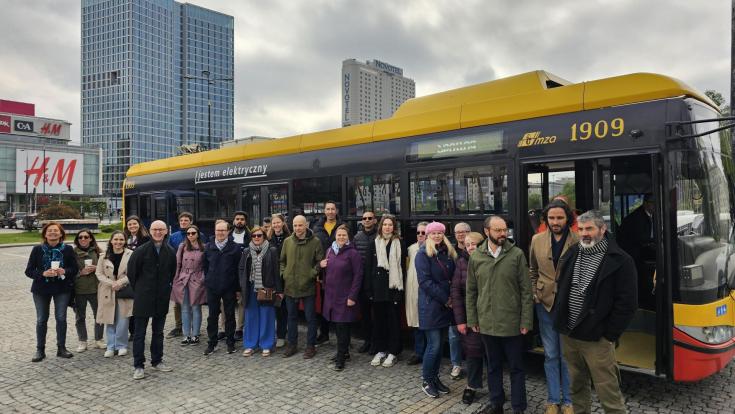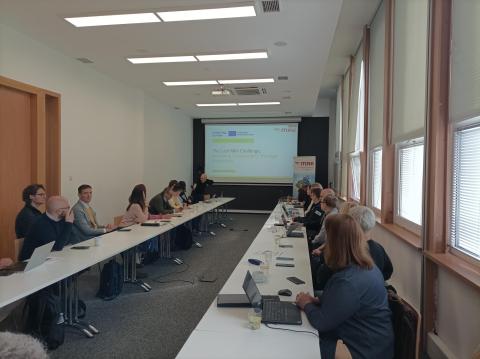SPOTLOG 3rd Exchange of Experience Event in Warsaw!

On 16 and 17th April 2024, Mazovia Energy Agency hosted the third Exchange of Experience event. The event gathered project partners and their regional stakeholders representing eight other European countries in Warsaw, Poland. During the event, a thematic seminar, project workshops and a visit to Mobility hub in Młociny were organised.
The first day of the EoE was the opportunity to share initiatives by SPOTLOG partners in the field of sustainable last-mile deliveries. These presentations offered valuable perspectives into each partner's work and their impact on the project.
Following the opening and review of agenda, the Lead Partne r (LP)directed attention towards the results of prior events, delivering a summary of the enriching exchange of ideas and valuable practices gathered thus far through interregional cooperation endeavors.
A participant representing Mechelen, specifically the University of Antwerp, highlighted the crucial importance of incentive mechanisms in promoting sustainable last-mile deliveries. By stressing the significance of energy conservation, selecting appropriate vehicles, optimizing routes, and strategically locating pick-up points near transit hubs, the speaker emphasized the necessity of employing various strategies.
Another stakeholder from Mechelen, a VPD operator, detailed their efforts to electrify fleets and enhance infrastructure to advance zero-emission logistics. Their focus on the importance of consistent public policies struck a chord with stakeholders, emphasizing the interconnectedness between policy frameworks and industry acceptance.

TTS Italia presented joint approaches for achieving zero-emission urban freight, while the Constanta Metropolitan Area highlighted pertinent issues concerning the absence of regulatory structures, advocating for logistics to be prioritized in urban planning efforts.
Tampere University discussed insights gained from the LOGY Conference 2024, concentrating on the convergence of artificial intelligence and sustainability to transform supply chains. The introduction of "Urban Track Discs" by stakeholder UDT Technologies ignited thought-provoking conversations as a potential revolutionary force in urban transportation.
T. Dombi, the representative from the City of Warsaw, emphasized the crucial importance of urban design, regulations, and enforcement in promoting efficient logistics. Meanwhile, the Municipality of Lille focused on reshaping urban areas to facilitate sustainable last-mile deliveries.
The Municipality of Rimini presented tools for multi-criteria decision-making to evaluate the sustainability of last-mile logistics. They stressed the significance of establishing direct links between producers and consumers.
Addressing challenges in low-density regions, representatives from Fundão Municipality and Vidzeme Planning Region highlighted pilot initiatives and local good practices, unravelling the importance of tailored solutions for diverse geographic contexts.
The concluding talk, presented by the LP, offered a summary of exemplary methods and essential performance metrics collected from various Interreg Europe initiatives.
One of the highlights of the EoE was the study visit to the Mobility hub in Młociny on the final day of the event. A representative from Public Transport Authority (ZTM) guided the SPOTLOG partners through the Park and ride parking lot (part of Młociny mobility hub), showcasing the area where electric cars can be charged free of charge. The operation mechanism and significance of such parking lots for mobility hubs and public transport were explained. There was short tour on bus and tram depot. During the visit to mobility hub, partners had the opportunity to see the electric bus depot equipped with pantographs, as well as the "Kwiatomat," a parcel locker containing fresh flower bouquets, serving as an example of convenience and innovation.
Aside from the productive project meetings and site visits, partners enjoyed engaging social gatherings aimed at building networks and enhancing mutual understanding among participants. This shared understanding plays a crucial role in aligning the project visions and objectives.
